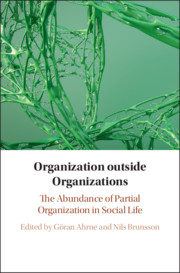Crossref Citations
This Book has been
cited by the following publications. This list is generated based on data provided by Crossref.
Laamanen, Mikko
Moser, Christine
Bor, Sanne
and
den Hond, Frank
2020.
A partial organization approach to the dynamics of social order in social movement organizing.
Current Sociology,
Vol. 68,
Issue. 4,
p.
520.
2020.
Publications Received.
Administrative Science Quarterly,
Vol. 65,
Issue. 1,
p.
272.
Köllner, Tobias
Simons, Fabian
Kleve, Heiko
von Schlippe, Arist
and
Rüsen, Tom A.
2020.
Vermögensmanagement in großen Unternehmerfamilien: Zwischen individuellem Anspruch und kollektiver Verantwortung.
ZfKE – Zeitschrift für KMU und Entrepreneurship,
Vol. 68,
Issue. 3–4,
p.
191.
Grothe‐Hammer, Michael
2020.
Membership and contributorship in organizations: An update of modern systems theory.
Systems Research and Behavioral Science,
Vol. 37,
Issue. 3,
p.
482.
Arora-Jonsson, Stefan
Brunsson, Nils
and
Hasse, Raimund
2020.
Where Does Competition Come From? The role of organization.
Organization Theory,
Vol. 1,
Issue. 1,
Trondal, Jarle
2020.
Public Administration and the Study of Political Order: Towards a Framework for Analysis.
Politics and Governance,
Vol. 8,
Issue. 4,
p.
120.
Arnold, Nadine
Hasse, Raimund
and
Mormann, Hannah
2021.
Organisationsgesellschaft neu gedacht: Vom Archetyp zu neuen Formen der Organisation.
KZfSS Kölner Zeitschrift für Soziologie und Sozialpsychologie,
Vol. 73,
Issue. 3,
p.
339.
Balay, Matthieu
Cooren, François
and
Dion, Frédéric
2021.
Processus organisants et formes organisées : Le cas de séances d’hypnose de rue.
Communication et organisation,
Vol. 59,
Issue. ,
p.
91.
Rachlitz, Kurt
2021.
Kooperation in der digitalen Arbeitswelt.
p.
89.
Brunsson, Nils
Gustafsson Nordin, Ingrid
and
Tamm Hallström, Kristina
2022.
‘Un-responsible’ Organization: How More Organization Produces Less Responsibility.
Organization Theory,
Vol. 3,
Issue. 4,
Trondal, Jarle
2022.
Flernivåstaten og krisehåndtering.
Nordisk Administrativt Tidsskrift,
Vol. 99,
Issue. 2,
Dolata, Ulrich
and
Schrape, Jan-Felix
2022.
Plattform-Architekturen.
KZfSS Kölner Zeitschrift für Soziologie und Sozialpsychologie,
Vol. 74,
Issue. S1,
p.
11.
Lindebaum, Dirk
den Hond, Frank
Greenwood, Michelle
Chamberlain, James A
and
Andersson, Lynne
2022.
Freedom, work and organizations in the 21st century: Freedom for whom and for whose purpose?.
Human Relations,
Vol. 75,
Issue. 10,
p.
1853.
Arnold, Nadine
and
Dombrowski, Simon
2022.
Dynamics of Standardised Quality. Long-term shifts in organic product qualification.
Valuation Studies,
Vol. 9,
Issue. 1,
p.
141.
Arnold, Nadine
2022.
Accountability in transnational governance: The partial organization of voluntary sustainability standards in long‐term account‐giving.
Regulation & Governance,
Vol. 16,
Issue. 2,
p.
375.
Frankel, Christian
2022.
The Object of Inquiry and Organization Studies.
Organization Studies,
Vol. 43,
Issue. 12,
p.
2013.
Avidov-Ungar, Orit
Shamir-Inbal, Tamar
and
Blau, Ina
2022.
Typology of digital leadership roles tasked with integrating new technologies into teaching: Insights from metaphor analysis.
Journal of Research on Technology in Education,
Vol. 54,
Issue. 1,
p.
92.
Berglund-Snodgrass, Lina
Fred, Mats
and
Mukhtar-Landgren, Dalia
2023.
In-between stability and adaptability.
disP - The Planning Review,
Vol. 59,
Issue. 2,
p.
22.
Pereira, Renata Cherém de Araújo
and
Aquino, André Carlos Busanelli De
2023.
Organization as Time.
p.
211.
Bor, Sanne
and
Cropper, Steve
2023.
Extending Meta-Organization Theory: A resource-flow perspective.
Organization Studies,
Vol. 44,
Issue. 12,
p.
1939.



